Classics and the Western Canon discussion
Divine Comedy, Dante
>
Paradiso 24: Peter Examines Dante in the Christian Faith
date newest »
newest »
 newest »
newest »
 Laurele wrote: "http://www.worldofdante.org/pop_up_qu...
Laurele wrote: "http://www.worldofdante.org/pop_up_qu...(I wasn't able to get the sound for this one.)..."
I did (get the sound). Beautiful. Had to download an MP3 file. Thank you for this, Laurele.
 ap·o·lo·gia
ap·o·lo·gianoun
1: an apology or a defense [the present volume is no apologia, on the contrary, it is the pugnacious self-vindication of an … able man — Times Literary Supplement]
2: justification of the acts of a person's life [En Miroir turns out to be an apologia, suffering from all the faults of self-justification — Times Literary Supplement]
Origin of APOLOGIA
Late Latin — more at apology
First Known Use: 1784 (sense 1)
“Apologia.” Webster's Third New International Dictionary, Unabridged. 2013.. Web. 06 Mar. 2013.
 http://www.worldofdante.org/media/ima...
http://www.worldofdante.org/media/ima...Sandro Botticelli: Paradiso Canto XXIV.1. “Eighth Sphere (Heaven of Fixed Stars); Beatrice Entreats St. Peter to Examine Her Ward in True Faith, The Prime Theological Virtue; Dante's Confession of Faith.” c.1480 - c.1495. Drawing.

 (Larger image:) http://www.worldofdante.org/media/ima...
(Larger image:) http://www.worldofdante.org/media/ima...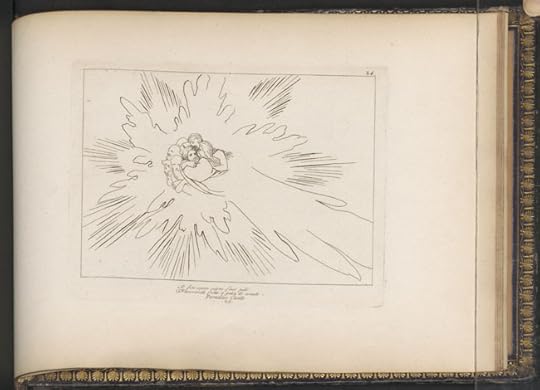
John Flaxman: Paradiso Canto XXIV.10. “Spirits Form Themselves into Circles on Fixed Poles.” 1793. Engraving.
 For Paradiso Canto XXIV images from the Bodleian Library 14th century manuscript try these:
For Paradiso Canto XXIV images from the Bodleian Library 14th century manuscript try these:http://www.bodley.ox.ac.uk/dept/scwms...
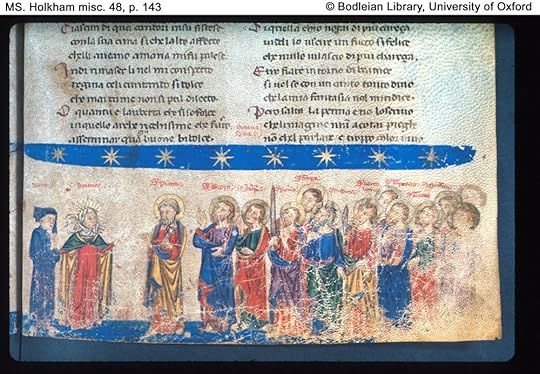
Paradiso Canto XXIV. “Dante and Beatrice Before St. Peter, Who Is Followed by the Apostles and St. Paul.”
http://www.bodley.ox.ac.uk/dept/scwms...
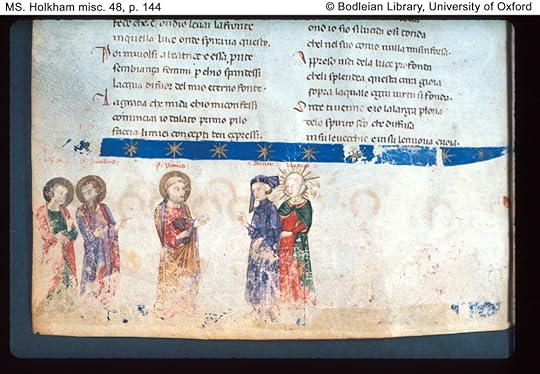
Paradiso Canto XXIV. “St. John and St. James; St. Peter Talks to Dante; Beatrice.”
 http://www.worldofdante.org/media/ima...
http://www.worldofdante.org/media/ima...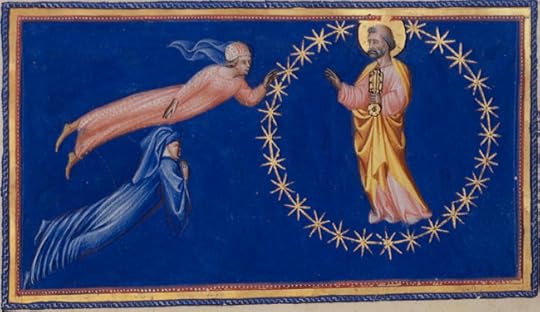
Giovanni di Paolo: Paradiso Canto XXIV.34. “St. Peter Introduces Himself to Dante.” c.1450. Manuscript illumination. Yates Thompson 36. British Library.
 http://www.worldofdante.org/media/ima...
http://www.worldofdante.org/media/ima...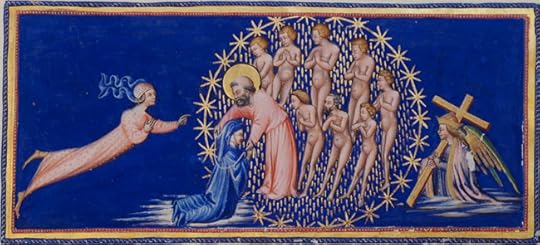
Giovanni di Paolo: Paradiso Canto XXIV.34. “St. Peter Examines Dante on Faith.” c.1450. Manuscript illumination. Yates Thompson 36. British Library.
Note here that it is the figure in blue kneeling before St. Peter, which leads me to believe that is Dante, despite the cowl.
 http://etcweb.princeton.edu/dante/pdp...
http://etcweb.princeton.edu/dante/pdp...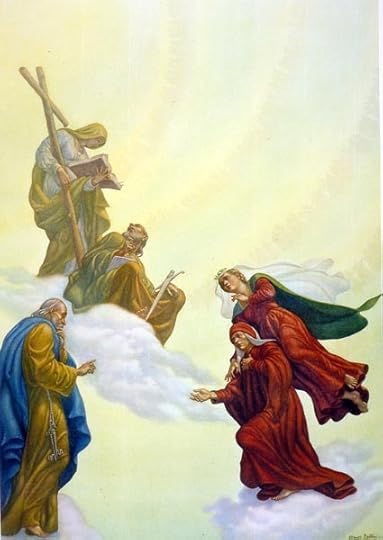
Amos Nattini: Paradiso Canto XXIV. "O sodalizio eletto a la gran cena 1923. (First line. In Hollander translation, that becomes “O company of the elect chosen to feast…”)
 In response to Peter's last question, Dante says that the miracle of the world's conversion is the greatest miracle of all, but then he says to Peter,
In response to Peter's last question, Dante says that the miracle of the world's conversion is the greatest miracle of all, but then he says to Peter,"...for you entered the world poor and hungry, to sow the good plant which was once a vine and is now become a thorn."
What does Dante mean by this? Is he talking about the Church? But if so, isn't it strange that Peter doesn't comment? Instead, the spheres launch into a "Te Deum Laudamus", which strikes me as very odd ...I get the feeling I'm misinterpreting something here.
 Thomas wrote: "In response to Peter's last question, Dante says that the miracle of the world's conversion is the greatest miracle of all, but then he says to Peter,
Thomas wrote: "In response to Peter's last question, Dante says that the miracle of the world's conversion is the greatest miracle of all, but then he says to Peter,"...for you entered the world poor and hungry..."
I interpret it the same way--Dante is saying that the greatest miracle of all is that poor and hungry Peter managed to found the Church, though it has turned from vine to thorn. Dante (the poet, not necessarily the character) is never shy about comdemning the church of his time in the most forceful terms. It makes me doubt those who say that the Catholic Church is now in its worst shape ever.
 Roger wrote: "It makes me doubt those who say that the Catholic Church is now in its worst shape ever.."
Roger wrote: "It makes me doubt those who say that the Catholic Church is now in its worst shape ever.."Like those who say Americans have never been more divided than they are now. They forget about that bad patch in the mid-19th century.
 Lily wrote: "Laurele wrote: "http://www.worldofdante.org/pop_up_qu...
Lily wrote: "Laurele wrote: "http://www.worldofdante.org/pop_up_qu...(I wasn't able to get the sound for this one.)..."
I did (get the sound). Beautiful. Had to download an MP3 file. Thank yo..."
Reynolds/Sayers note:
ll. 112–13: When I had done, the Court of Heaven rang with the “Te Deum”: Dante’s answers have proclaimed him a true believer, and the saints sing the great hymn, “We praise thee, O God”, which was written by St Ambrose on the occasion of St Augustine’s conversion. Dante had already heard it sung when he passed through the gateway to Purgatory (cf. Purg. ix. 139–42), as though the souls there rejoiced that a new soul had entered on its way of purgation. Similarly, the souls in Heaven rejoice in accepting Dante as a true believer.




CHRIST AND MARY having ascended to the Empyrean, St. Peter remains as the chief soul of the Garden of Christ’s Triumph. Beatrice addresses the souls in Dante’s behalf, and they, in their joy, form into a dazzling VERTICAL WHEEL OF SPINNING RADIANCES. Beatrice then begs St. Peter to conduct an EXAMINATION OF DANTE’S FAITH. St. Peter thereupon questions Dante on the NATURE OF FAITH, THE POSSESSION OF FAITH, THE SOURCES OF FAITH, THE PROOF OF THE TRUTH OF FAITH, MAN’S MEANS OF KNOWING THAT THE MIRACLES OF FAITH ACTUALLY TOOK PLACE, and finally on THE CONTENT OF CHRISTIAN FAITH. Dante answers eagerly, as would a willing candidate being examined by his learned master. The examination concluded, St. Peter shows his pleasure by dancing three times around Dante.
Reynolds/Sayers:
Dante’s Examination in Faith, Hope, and Love: According to the teaching of Aquinas, three qualifications are essential before the soul can attain to participation in the Beatific Vision, namely, faith, hope, and love. These are the three theological principles or virtues which direct the soul aright to God. They cannot be acquired by human acts but only by grace operating through revelation. In the story, Dante actually undergoes examination in these three virtues and, on satisfying his examiners, is allowed to proceed on his journey. On the mystical level of the allegory, man’s soul cannot progress by understanding and knowledge alone. In the Monarchia, III, xvi, 43–63, Dante has already expressed in abstract terms the teaching which he here presents in allegorical form. Man by his proper power may not ascend to the blessedness of eternal life unless assisted by the divine light. This light is mediated to us by spiritual teachings which transcend human reason, as we follow them by acting according to the theological virtues, faith, hope, and charity. It is interesting to consider also the personal implications of the allegory. There is an early tradition that Dante was at one time brought under suspicion and enquiry by the Inquisition for heresy. If this is so, or if the tradition merely represents misgivings as to Dante’s orthodoxy, the examination in faith may have been intended as an apologia. It is said that Dante had had personal experience of such formal examinations as he here undergoes during his time as a student at the University of Paris (if he went there), some commentators even going so far as to maintain that he underwent the preparation for a doctorate in theology.
Music:
http://www.worldofdante.org/pop_up_qu...
(I wasn't able to get the sound for this one.)